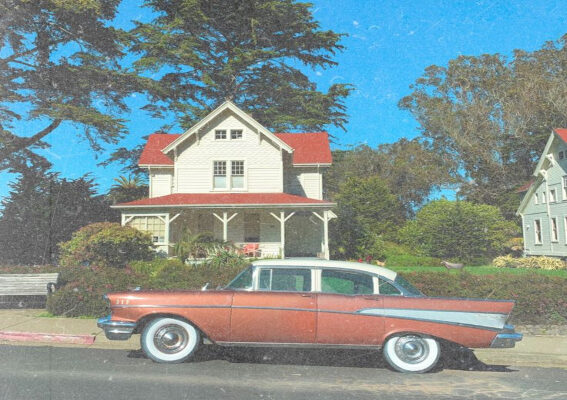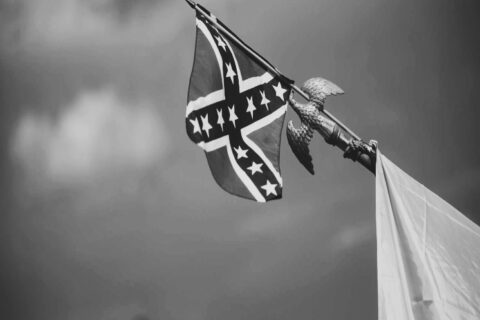I recently reread Victoria: A Novel of 4th Generation War by William S. Lind. He published it under the name Thomas Hobbes. I can’t really recommend it as it’s eye-rolling in its premise and plot and the dialogue is trite. You can tell which characters are Mary-Sue stand-ins for Lind and the people he cares for in his life. To call the book an “analogical allegory” is to give it too much credit. Indeed, its page on TV Tropes is impressive in its length given the relative brevity of the book. The book is amusing at times, even though it’s so “on the nose” it may as well be one of those dumpster fire doorknocker bull-rings women have become obsessed with wearing in their septums. I must confess, I like the book because of the people who hate it.
In the book, the chief stand-in for Lind, Bill Kraft, espouses a taste for “retro-culture.” He owns nothing made after 1965. The New England states all eventually adopt this and go further back in their restrictions to the 1930s. The idea espoused is that technology has dehumanized people and is a root-cause for a lot of social problems, if not all of them. This puts the cart squarely before the horse.
All of the arguments Lind attempts to use for retro-culture in Victoria, which is indeed an ideology, are arbitrary. Ideologies are condemned by Kraft in the book in very strict terms and, when challenged that retro-culture is an ideology, he makes an uncompelling argument that it’s merely “returning to a saner way of life.” He argues television is a cause, much less a necessary precondition, for filth and Marxism. One could equally argue the Gutenberg press was a cause for Jehovah’s Witnesses or even Lady Chatterley’s Lover and the subsequent obscenities foisted on mankind.
Technology certainly enables laxity and provides a cloak to societal decay, but people seem to have a strange fetish for wanting to pause technological innovation at the level they are most nostalgic for, extending to periods they never personally experienced. I do agree that there are technologies that are not neutral in their uses. Prophylactics are a great example. So is gain-of-function research. We should prohibit evil knowledge.
It seems to me that a better answer to the media conundrum is a “league of decency.” We had one and produced some of the best cinema ever made. Our society imposed its moral sensibilities onto the creative industry and we received good art in exchange, and subversion remained banished to the outskirts of acceptable society.
In the book, Lind also laments that long-range vehicles destroy a sense of community that forms in areas where people do not travel often or far (he argues media compounds this). The problem is, he’s again putting the cart before the horse. In traditional small towns and in cities, families often had long-range cars and still knew and visited their neighbors. I grew up in the suburbs and was hardly alienated. That came later. It wasn’t technology. It had more to do with what Robert Putnam grudgingly discovered in Bowling Alone.
Social alienation is certainly exacerbated by technology, but it’s caused by a lack of trust and other products of the growing dysmorphia between reality and the reality dictated by conventional sources via forced-consensus. Isolation, narcissism, and alienation don’t pour out of media. We pour ourselves into media because of isolation, narcissism, and alienation.
The rootlessness of the modern United States is due to economic and crime patterns. Given the collapse of the job market due to outsourcing, insourcing, and, to an overstated extent, automation, people have abandoned long-time family homelands. A society of strangers without the trust or warmth to make new bonds will quickly devolve into alienation. The military has to make concerted efforts to force strangers into communities due to the nature of duty stations and transfers. The real struggle is in rebuilding communities rather than some great technological evil.
Moreover, the reason your television beams in evil is because evil people are behind the beam. One could equally lament how the record and the radio destroyed live music. Why stop at the 1930s (this author reflected and placed “19” before “30’s” as it occurs to him that we will shortly be in the 2030s and whatever dread that holds for us)? Because Lind is making some unprincipled exceptions. I don’t think any society in the 1930s had the level of piety, earthiness, and community of the 1030s. Ought we tear off our roofing and replace it with thatch? If it’s an argument of inconvenience, no. Is 1930s retro-culture an exception on the convenience of the level of technology the author feels he can live with comfortably? It seems so.
I’m afraid the answer lies in discipline in discernment. These two things are particularly difficult for people, and they have become more difficult. One remembers the common refrain in Judges, “And every man did what was right in his own eyes.” Yes, there must be standards. No, they will not always be clear. Discernment and discipline require constant energy and attention.
If you read your Bible, you’re no stranger to this notion. Salvation isn’t a “fire-and-forget” concept. Our Founding Fathers thought the Constitution would preserve the core of the country they founded and prevent all gross perversion and the descent into “democracy.” Rules and laws only have effect inasmuch as the people have a will to enforce them. The rules have faded, and we have people arguing ridiculous ideas like that the 2nd Amendment only applies to conventional weapons of the 18th Century while exempting the 1st Amendment so that the media can continue to pelt us with filth and lies at 5G speeds. A law isn’t worth a damn if nobody follows it and there’s no punishment for those who transgress.
People will always experience temptation, and there will always be a market for sin. It’s a matter of personal responsibility to resist. Community can help and make participation in sin costly. But you must choose to assent to be part of such a community and to perpetuate this community. We’re back at the problem of human will and the requirements of discipline and discernment.
Winding the clock back to an arbitrary date technologically, will not fix these problems. The Amish, although suffering far less vice than the average American, are still tethered to the fate of America. The military, in Victoria, maintains an exemption to the laws about technology. This is a necessity. You don’t fight your mortal enemy with shield and sword while they call in drone strikes and various other things you call “unsporting.” Yes, we have “Just War” theory, but it’s worth noting that historically this only applied to Christendom. When Europe went to war with Saracens, they showed no quarter, for they were shown none. At any rate, Just War theory went out the window with WWI. You could make an argument that it first began to lapse in the Napoleonic Wars with the act of conscription to go kill other European Christians rather than relying on professional militaries. Perhaps we can return to more chivalric notions of violence between Europeans when there’s a “Europe” to speak of. To do so now would only invite disaster.
One thing remains clear: we can’t simply “go back” and rewind the clock from where we are now. Even if we had the political will and force to return to a different technological era, I feel confident that the temptations would persist, and people would find novel ways to create misery. We would inevitably find ourselves in the chimeric environment in which we live today. Moreover, we would deny ourselves many of the graces God has granted us through intellect. I believe “Science” must become a lower-case “s-word” again and resume its prior status as a study of the natural world as God made it, and that all good things are a gift from God. However, the arbitrary limitation of our technological capacity will not address the fundamental problems of discipline and discernment.
I’ll leave you with the words of Dimitri Karamazov in Fyodor Dostoevsky’s The Brothers Karamazov. “The awful thing is that beauty is mysterious as well as terrible. God and the devil are fighting there and the battlefield is the heart of man”





